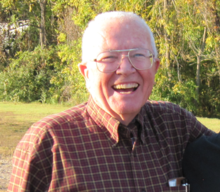William M. Bass
William Marvin Bass III (born August 30, 1928 in Staunton, Virginia ) is an American forensic anthropologist .
resume
Bass was born in Staunton, Virginia . He began his education at the University of Virginia , where he received his BA in Psychology in 1951 . From 1951 to 1953, Bass served in the US Army . He then continued his studies at the University of Kentucky , where he obtained a master's degree in anthropology . He moved to the University of Pennsylvania , where he received his Ph.D. , also in anthropology. One of his teachers there was Wilton Krogman . Together with him and a team from the Smithsonian Institute , he undertook archaeological excavations of bones of the Native Americans in the Great Plains . These formed the basis for his dissertation . From 1960 to 1971 Bass taught at the University of Kansas . In 1971 he followed a call to the Department of Anthropology at the University of Tennessee . From 1992 to 1994 Bass was director of the Forensic Anthropology Center there , and he retired in 1995.
Bass didn't originally plan to become a forensic anthropologist, but a psychologist. He also took a course in anthropology, according to his own statements "just for fun". In the spring of 1955, the course instructor, Dr. Charles Snow to participate in a corpse identification. It was a woman who had been killed and burned in a traffic accident. This activity, which was paid for at five dollars, was so interesting for Bass that he switched to another subject. Bass said in an interview about the event:
"It was like a light bulb went on above my head. That was the 'aha' - that was the moment when I knew what I wanted to do for the rest of my life. I went home, talked to my wife, and changed my major to anthropology. It was the best move I ever made. "
He writes about the examined case:
"It was fascinating to see the way burned and broken bones could identify a victim, solve a long-standing mystery and close a case."
Inextricably linked with the name Bass is the term " Body Farm ", an open-air test site that he set up in 1971 at the University of Tennessee with the official name of the Anthropological Research Facility .
In addition to teaching, Bass was also an advisor to the FBI and helped resolve numerous criminal cases . A particularly spectacular case was the Tri-State Crematory Scandal in 2002: More than 300 corpses were not cremated but buried in pits and vaults, and the relatives were given urns with the ashes of burned wood. These corpses, mostly already badly decayed, could all be identified and properly buried by a team led by Bass.
Overall, Bass helped to resolve around 600 criminal cases, published over 200 articles in specialist journals and is the author or co-author of three books.
Awards
- American Academy of Forensic Sciences Physical Anthropology Award, 1985
- National Professor of the Year, 1984–1985
- American Academy of Forensic Sciences Distinguished Fellow, 1994
- UT Chancellor's Citation for Service to the University, 1994
- University of Kentucky Distinguished Alumni Award, 1994
Publications (excerpt)
Books
- Human osteology: a laboratory and field manual
- Death's Acre: Inside the Legendary Forensic Lab the Body Farm Where the Dead Do Tell Tales , together with Jon Jefferson , ISBN 0425198324
- German edition: The bone reader. The founder of the legendary Body Farm tells , ISBN 3442153948
- Forensic Osteology: Advances in the Identification of Human Remains , together with Kathleen J. Reichs , ISBN 0398068046
items
WM Bass u. a .: Recognition of cemetery remains in the forensic setting. In: J. Forensic Sci. , 1991, 36 (1). Pp .: 230-237
WM Bass: Outdoor composition rates in Tennessee. In Forensic Taphonomy: The Postmortem Fate of Human Remains , CRC Press, New York
swell
Tennessee Alumnus Magazine, Vol. 86 (2), 2006
| personal data | |
|---|---|
| SURNAME | Bass, William M. |
| ALTERNATIVE NAMES | Bass, William M. III; Bass, Bill |
| BRIEF DESCRIPTION | American anthropologist |
| DATE OF BIRTH | August 30, 1928 |
| PLACE OF BIRTH | Staunton, Virginia |

